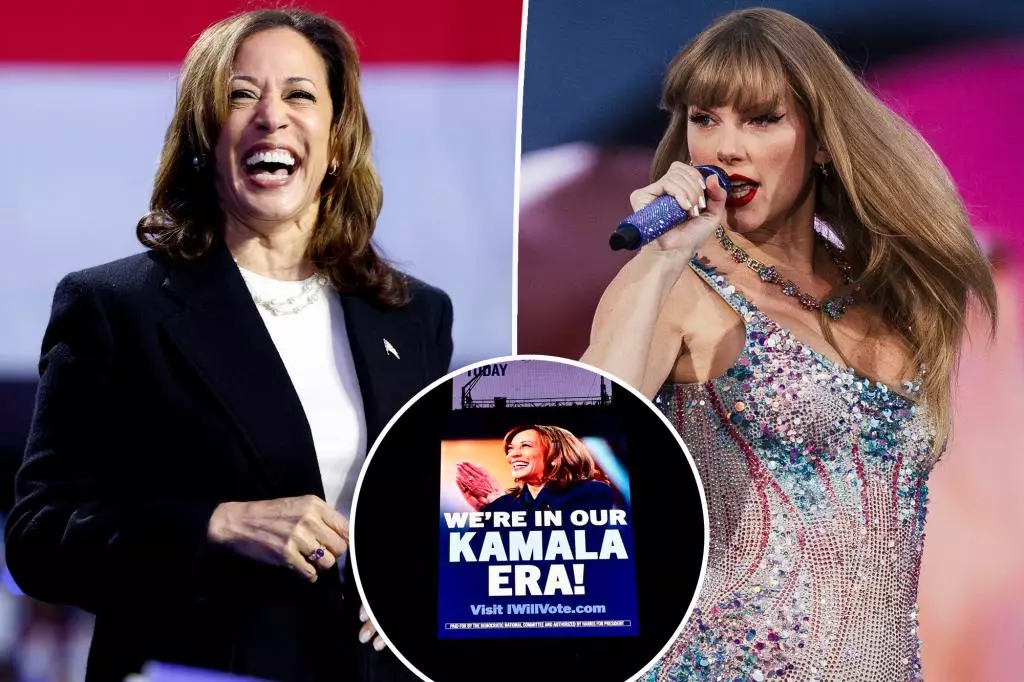The intersection of politics and pop culture has long been a field of fascination, with celebrities often wielding significant influence in shaping public opinions and voting behaviors. Recent developments in the 2024 presidential election highlight this dynamic power, especially following an unexpected endorsement from global music icon Taylor Swift for Vice President Kamala Harris. Analyzing this event can reveal deeper insights into the ways celebrity endorsements can affect political campaigns, voter engagement, and the strategies candidates employ to navigate this unique landscape.
A Celebutante’s Impact on Politics
Swift’s endorsement arrived on the heels of Harris’s campaign launching an ambitious advertising initiative in New York City’s vibrant Times Square, underscoring their strategy to capitalize on high-profile endorsements. One billboard, featuring an image of Harris alongside the phrase “We’re in our Kamala era,” sends a clear message — the campaign is eager to associate Harris with the enthusiasm and loyalty often seen among Swift’s fan base. This tactic reflects a growing trend where political figures tap into the cultural currency of pop stars to create a more engaging narrative for their campaigns.
In addition to the Times Square ads, similar Swift-inspired billboards appeared on the bustling Las Vegas Strip, illustrating how Harris’s campaign is leveraging celebrity allure to reach potential voters. By crafting messages that resonate with Swift’s lyrics—such as “A New Way Forward… Ready for It?”—the campaign cleverly intersects political messaging with pop culture, thereby attempting to energize a younger voter demographic.
Swift’s announcement on Instagram, where she identified herself as a supporter of Harris and her running mate, Tim Walz, has undoubtedly energized their campaign. By articulating her reasons for support — citing Harris’s commitment to crucial social issues like LGBTQ+ rights and women’s autonomy — Swift is not only sharing her political stance but actively mobilizing her millions of fans. Reports indicate that this endorsement prompted a surge of over 400,000 voter registrations within 24 hours, demonstrating the tangible effects celebrity endorsements can have on political engagement.
This phenomenon speaks to the potent role that pop culture plays in democratic processes; Swift’s influence shows how a single endorsement can bridge the gap between politics and everyday citizens, making the electoral process feel more accessible and interconnected with cultural values.
The Competitive Landscape
However, the endorsement has also drawn responses from other political figures, including former President Donald Trump, who attempted to overshadow Swift’s influence by releasing a merchandise line that is humorously reminiscent of her own tour-themed apparel. By creating his own versions of Swift’s merchandise, Trump illustrates how he, too, aims to engage with the same enthusiastic voter base Harris seeks to attract. Nevertheless, Trump’s dismissive remarks about Swift’s endorsement — claiming he favored her friend Brittany Mahomes instead — reveal a more profound frustration about not securing her backing, as well as a sense of competition fueled by celebrity status.
Interestingly, such dynamics create a cutthroat environment where political narratives can shift swiftly, echoing both the fleeting nature of pop culture and the rapid responsiveness that elections can necessitate. The intentional juxtaposition of Swift’s support for progressive causes versus Trump’s attempts to co-opt her brand further reveals the challenges facing political candidates in an age where celebrity can sway public opinion in unpredictable ways.
As political landscapes evolve, the necessity of integrating cultural figures into strategic campaigning is becoming increasingly apparent. Taylor Swift’s endorsement of Kamala Harris serves as a testament to the unmatched power celebrities hold in shaping the electoral conversation. From energizing voter bases to crafting compelling narratives, these endorsements signal a shift in political communication strategies, placing significant weight on the intersection between entertainment and governance.
As the 2024 election cycle approaches, candidates must navigate this complex terrain aware that their campaigns may hinge not only on policies and debates but also on the cultural icons who lend their voices to their causes. The implications are profound, as we may be stepping into an era where the pulse of popular culture directly influences the heartbeat of democracy.

